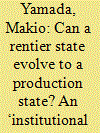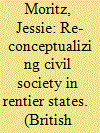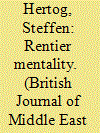|
|
|
Sort Order |
|
|
|
Items / Page
|
|
|
|
|
|
|
| Srl | Item |
| 1 |
ID:
171899


|
|
|
|
|
| Summary/Abstract |
Can a rentier state evolve to a production state? This article attempts to answer this question by analysing how historically states evolved to production states and by comparing their experience with today’s Gulf states. Although the Gulf states show some productive traits today, their mode of production largely remains ‘production with rentier characteristics’, that is reliant on oil-driven advantages. Their further economic diversification requires improved governance capabilities that enable their government to enhance human capital. Production states around the world acquired such governance capabilities through ‘institutional upgrading’, a replacement of clientelistic institutions with meritocratic ones. While clientelistic institutions tend to persist, such institutions were significantly reduced in these states through the exit of vested-interest players from major fiscal and organizational spaces. The exit appears to occur when these vested-interest players accept pain-sharing to ensure their protection in the context of the revealed vulnerability of their patron regime and when alternative productive gains are offered to them in lieu of conventional distribution. Presently neither condition is in existence in the Gulf states, which continue to be characterized by their direct and extensive distributional regimes. Without a prospect for immediate governance improvement, a realistic reform possibility lies in agency under institutional constraints.
|
|
|
|
|
|
|
|
|
|
|
|
|
|
|
|
| 2 |
ID:
171904


|
|
|
|
|
| Summary/Abstract |
Climate change poses a strategic dilemma for oil-exporting states of the Gulf. By sapping global demand for crude oil, climate action threatens the economic rents that underpin their governance and regime legitimacy. However, the Gulf states are also among the countries most exposed to physical risks of a warming climate and thus would benefit most from reducing ongoing accumulations of carbon in the atmosphere and associated adaptation costs. In other words, the political and economic risks of climate action run counter to the physical and environmental risks. These bifurcated interests differentiate the Gulf producers from oil exporters in more temperate regions, which would experience milder short-run damage—or even benefits—from a warming climate. A successful economic diversification strategy could address both physical and economic risks but would require structural changes in rentier governance.
|
|
|
|
|
|
|
|
|
|
|
|
|
|
|
|
| 3 |
ID:
171902


|
|
|
|
|
| Summary/Abstract |
This paper endeavours to answer several key questions: Firstly, why do many young Saudis have a continued preference for public sector employment over private sector jobs despite the government’s promotion of the private sector as a key pillar of Saudi Vision 2030? Secondly, what are the reasons behind a widespread perception among Saudi undergraduates that the current education system, spanning elementary to high school, does not prepare school pupils for entry into tertiary education? Thirdly, why do young Saudis maintain that the education system frequently fails to prepare them for future jobs or, indeed, does not provide them with adequate opportunities to think about their future jobs? Primary data gathered for this paper demonstrate that there is still a marked preference for public sector employment among young Saudis due to a widespread belief that the public sector offers more ‘job security’. In addition, the paper finds that the failure of the education system to prepare young nationals for entry into the labour market is considered to be particularly true for private sector employment.
|
|
|
|
|
|
|
|
|
|
|
|
|
|
|
|
| 4 |
ID:
171897


|
|
|
|
|
| Summary/Abstract |
This special issue revisits the ideas of rentierism, or rentier state theory (RST), advanced in Hazem Beblawi and Giacomo Luciani’s edited volume The Rentier State (1987), with particular focus on countries in the Gulf and Arabian Peninsula.1 Rentierism/RST, a theory that posits negative effects of external income and its distribution on political liberalism and economic development, has been serving as the dominant intellectual frame of reference for studies of resource-dependent countries in the Gulf and wider Middle East and North Africa region over the past three decades, both for scholars elaborating on it and for those critical of it.
|
|
|
|
|
|
|
|
|
|
|
|
|
|
|
|
| 5 |
ID:
171905


|
|
|
|
|
| Summary/Abstract |
Civil society is typically understood as weak or irrelevant in Gulf rentier states, the assumption being that rent-derived wealth allows the state to co-opt or repress associational life. However, for all these claims about the relationship between rents and civil society, rentier state theory relies on a number of assumptions regarding the nature of civil society itself, specifically that civil society is, by definition, independent of the state, formal and public in organization, and pro-democratic in orientation. This article examines where relaxation of these assumptions allows us to better understand the political activities of civil society groups in Gulf rentier states, even as co-optative and repressive governance tactics continue to limit space for political activity. Instead of focusing on traditional forms of civil society, we should instead search for those parts of Gulf society that fulfil the function of civil society in terms of societal entities that act collectively to pursue a political purpose (including both engagement with the state over policy matters and debates on moral and social societal norms).
|
|
|
|
|
|
|
|
|
|
|
|
|
|
|
|
| 6 |
ID:
171901


|
|
|
|
|
| Summary/Abstract |
Large fiscal deficits brought about by the decline in oil prices in late 2014 and long-standing challenges with youth unemployment have been two of the dominant underlying pressures driving economic policy in Saudi Arabia in recent years. In decades past, issues of unemployment were addressed through public sector hiring, but with increasingly limited resources, these old mechanisms are becoming less viable, giving way to a post-distributive policy environment. By exploring the dual pressures being exerted on the state by high levels of unemployment on the one hand and large fiscal deficits on the other, the resulting, seemingly contradictory policy outcomes are identified, examined, and contextualized in this paper. ‘Reform dissonance’ is the term used to describe the complex picture that emerges, where the private sector is confronted with a confusing policy landscape resulting from liberal and statist economic agendas being pursued simultaneously and in the absence of significant coordination. In particular, this chapter argues that this phenomenon of ‘reform dissonance’—contradictory policy outcomes resulting from the lack of coordination between different reform initiatives—is manifested in persisting public sector entitlements, the crowding-out effect by SOEs, and the persisting mismatch between the pace of human capital development and labour nationalization quotas.
|
|
|
|
|
|
|
|
|
|
|
|
|
|
|
|
| 7 |
ID:
171898


|
|
|
|
|
| Summary/Abstract |
The “rentier mentality” has been a key concept in rentier state theory since its development in the 1980s. It predicts that reliance on state patronage breaks the link between effort and reward, leads to low achievement orientation in economic life and makes citizens politically passive. Yet the rentier mentality hypothesis has hardly been empirically tested to date. This paper seeks to fill this gap through an analysis of a range of GCC survey data, including a previously unpublished survey of Saudi citizens’ labour attitudes. A key descriptive finding is that many GCC citizens do indeed evince rentier attitudes when it comes to concrete life choices – but at the same time, a disproportionate share of them claim to be generally in favour of hard work, competition, and a small state. When it comes to politics, levels of interest are unusually high, but are coupled with high levels of loyalty and confidence in government. These results mean that while some aspects of rentier mentality are indeed prevalent, other attitudinal predictions of rentier state theory do not hold up – potentially because rentier states have adapted since the 1980s and used a range of social engineering tools to instil pro-business and patriotic beliefs on an abstract, ideational level.
|
|
|
|
|
|
|
|
|
|
|
|
|
|
|
|
| 8 |
ID:
171903


|
|
|
|
|
| Summary/Abstract |
The economic reform agenda moving across the Gulf Cooperation Council states precipitated by the end of a decade-long run of high oil prices, high population growth rates, and costly demands on the provision of generous state services and subsidies has had some unexpected consequences. The reformulation of state-society relations, especially with regard to ideas of how to create economic growth and how to model a future social contract, challenges the accepted literature and construct of rentierism. This essay focuses on one distinctive site of these shifting relations between rentier states and their citizens: the sovereign wealth fund (SWF). SWFs are based upon the shared rents from oil production, but as they have evolved they are also becoming transformative in new national development strategies. Some SWFs now veer from traditional practices of safeguarding wealth to more experimental and high-risk strategies that claim to be able to diversify national economies from oil dependency, while also promising high returns. The current moment of late rentierism heightens questions of ownership and of the state’s role as guardian or steward of society’s wealth. Using SWFs to examine state-society relations and rentierism across the Gulf, this article focuses on the Saudi case.
|
|
|
|
|
|
|
|
|
|
|
|
|
|
|
|
| 9 |
ID:
171900


|
|
|
|
|
| Summary/Abstract |
This paper aims to theorize the relationship between religion and rentierism. Existing literature on rentier states of the Gulf Cooperation Council (GCC) focuses on the means by which oil rents facilitate economic and political co-optation while failing to address co-optation of the religious sector, which is arguably as important for government maintenance of social and political legitimacy. In this paper, which focuses on the post-2011 era, we assess the existing literature on this topic in order to identify important gaps, before assessing the means and mechanisms, as well as the comparative efficacy, of religious control across the six states of the GCC. We then draw conclusions about the ways in which control of rentier-funded religious institutions reflects the degree of political control exerted by governments in these countries more broadly, as well as how levels of rentier wealth can dictate the level of control over religious life. Specifically, we identify a trend towards greater centralization of control of the religious sphere and of political life in Bahrain, Oman, Saudi Arabia, and the United Arab Emirates (UAE), with a tendency towards co-optation in Kuwait and Qatar.
|
|
|
|
|
|
|
|
|
|
|
|
|
|
|
|
|
|
|
|
|